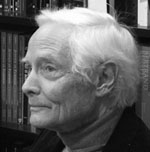W.S. Merwin: Poetry & What Can’t Be Expressed
 Last Friday night, Mrs. Beatrice and I had the pleasure of attending a New York Public Library event featuring W.S. Merwin, just a few days before his official appointment as the new U.S. Poet Laureate began. In a conversation with NYPL public programming director Paul Holdengräber, Merwin went all the way back to the beginning to discuss his love for language, starting with how he had learned to read when he was three (or maybe four?) from a book that had drawings of Native Americans living in the forests (which, back on the NYPL stage, soon got him to thinking about the lost lyric poetry of Native America). He got to thinking about poetry as “language about what cannot be said,” citing the notion that “the more one wants to express gratitude, the less adequate the words are,” and about poetry as an expression of the idea that whenever we look at something, we are seeing it both for the first time and the last time.
Last Friday night, Mrs. Beatrice and I had the pleasure of attending a New York Public Library event featuring W.S. Merwin, just a few days before his official appointment as the new U.S. Poet Laureate began. In a conversation with NYPL public programming director Paul Holdengräber, Merwin went all the way back to the beginning to discuss his love for language, starting with how he had learned to read when he was three (or maybe four?) from a book that had drawings of Native Americans living in the forests (which, back on the NYPL stage, soon got him to thinking about the lost lyric poetry of Native America). He got to thinking about poetry as “language about what cannot be said,” citing the notion that “the more one wants to express gratitude, the less adequate the words are,” and about poetry as an expression of the idea that whenever we look at something, we are seeing it both for the first time and the last time.
Holdengräber asked Merwin about the time when, as a young adult, he met with Ezra Pound at St. Elizabeth’s—”it wasn’t violent like Christopher Smart’s Bedlam would have been, but it was pretty weird”—and Merwin reflected that “we all owe [Pound] somethng enormous,” adding that every poet of his generation, upon reading Pound’s translation of “The River-Merchant’s Wife,” must have felt moved by the imagery and the language. Pound encouraged the young Merwin, who hadn’t yet acquired the life experiences to write meaningful poetry of his own, to work on translation, steering him towards the Provencal troubadors; years later, Merwin got another valuable bit of advice from Clarence Brown, who worked with him on putting the poems of Osip Mandelstam into English: “Don’t worry about it—no translation ever spoiled the original.” (Merwin also read a more recent translation, “Little Soul.)
Finally, Merwin talked a bit about his initial ambivalence towards the laureateship—”I’m not going to come to Washington and spend a lot of time wearing a suit and all that”—and why he finally decided to accept: “I’m horrified with our behavior towards the rest of life… denying global warming, at this point; I mean, honestly.” He hopes, through this public role, to be able to say: “Look, there’s another way of looking at the world… The feeling of being part of life itself is one of joy and elation.”
26 October 2010 | events |

 Our Endless and Proper Work is my new book with Belt Publishing about starting (and sticking to) a productive writing practice.
Our Endless and Proper Work is my new book with Belt Publishing about starting (and sticking to) a productive writing practice. 
